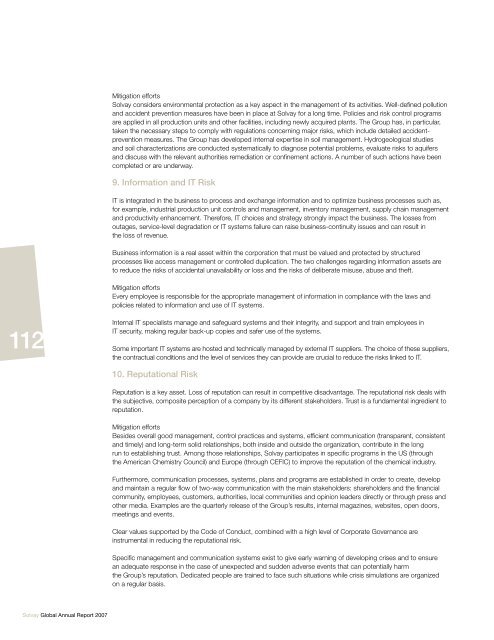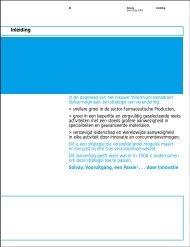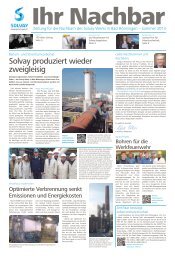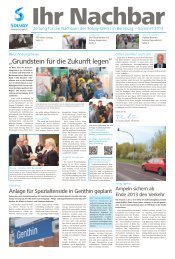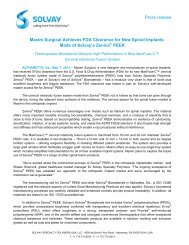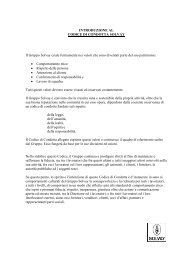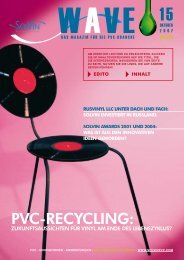+1 - Solvay
+1 - Solvay
+1 - Solvay
You also want an ePaper? Increase the reach of your titles
YUMPU automatically turns print PDFs into web optimized ePapers that Google loves.
Mitigation efforts<br />
<strong>Solvay</strong> considers environmental protection as a key aspect in the management of its activities. Well-defined pollution<br />
and accident prevention measures have been in place at <strong>Solvay</strong> for a long time. Policies and risk control programs<br />
are applied in all production units and other facilities, including newly acquired plants. The Group has, in particular,<br />
taken the necessary steps to comply with regulations concerning major risks, which include detailed accidentprevention<br />
measures. The Group has developed internal expertise in soil management. Hydrogeological studies<br />
and soil characterizations are conducted systematically to diagnose potential problems, evaluate risks to aquifers<br />
and discuss with the relevant authorities remediation or confinement actions. A number of such actions have been<br />
completed or are underway.<br />
9. Information and IT Risk<br />
IT is integrated in the business to process and exchange information and to optimize business processes such as,<br />
for example, industrial production unit controls and management, inventory management, supply chain management<br />
and productivity enhancement. Therefore, IT choices and strategy strongly impact the business. The losses from<br />
outages, service-level degradation or IT systems failure can raise business-continuity issues and can result in<br />
the loss of revenue.<br />
Business information is a real asset within the corporation that must be valued and protected by structured<br />
processes like access management or controlled duplication. The two challenges regarding information assets are<br />
to reduce the risks of accidental unavailability or loss and the risks of deliberate misuse, abuse and theft.<br />
Mitigation efforts<br />
Every employee is responsible for the appropriate management of information in compliance with the laws and<br />
policies related to information and use of IT systems.<br />
112<br />
Internal IT specialists manage and safeguard systems and their integrity, and support and train employees in<br />
IT security, making regular back-up copies and safer use of the systems.<br />
Some important IT systems are hosted and technically managed by external IT suppliers. The choice of these suppliers,<br />
the contractual conditions and the level of services they can provide are crucial to reduce the risks linked to IT.<br />
10. Reputational Risk<br />
Reputation is a key asset. Loss of reputation can result in competitive disadvantage. The reputational risk deals with<br />
the subjective, composite perception of a company by its different stakeholders. Trust is a fundamental ingredient to<br />
reputation.<br />
Mitigation efforts<br />
Besides overall good management, control practices and systems, efficient communication (transparent, consistent<br />
and timely) and long-term solid relationships, both inside and outside the organization, contribute in the long<br />
run to establishing trust. Among those relationships, <strong>Solvay</strong> participates in specific programs in the US (through<br />
the American Chemistry Council) and Europe (through CEFIC) to improve the reputation of the chemical industry.<br />
Furthermore, communication processes, systems, plans and programs are established in order to create, develop<br />
and maintain a regular flow of two-way communication with the main stakeholders: shareholders and the financial<br />
community, employees, customers, authorities, local communities and opinion leaders directly or through press and<br />
other media. Examples are the quarterly release of the Group’s results, internal magazines, websites, open doors,<br />
meetings and events.<br />
Clear values supported by the Code of Conduct, combined with a high level of Corporate Governance are<br />
instrumental in reducing the reputational risk.<br />
Specific management and communication systems exist to give early warning of developing crises and to ensure<br />
an adequate response in the case of unexpected and sudden adverse events that can potentially harm<br />
the Group’s reputation. Dedicated people are trained to face such situations while crisis simulations are organized<br />
on a regular basis.<br />
<strong>Solvay</strong> Global Annual Report 2007


